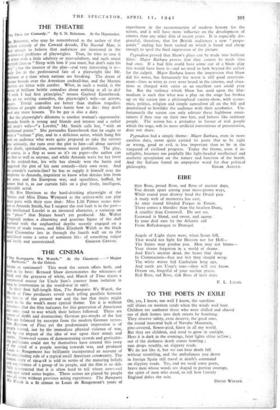- THE CINEMA The Ramparts We Watch." At the Gaumont.-- ,, Major
Barbara." At the Odeon.
SATIRE or sentiment? This week the screen offers both, and each at its best: Bernard Shaw demonstrates the whiteness of black and the greyness of white, and March of Time traces a sentimental course for Uncle Sam's journey from isolation in 1914 to intervention in the world-war in 1917.
In their first full-lengih film, The Ramparts We Watch, the March of Time producers reveal such telling parallels between the histr•ry of the present war and the last that theirs might seem to be the week's more cynical theme. Yet it is without bitterness that the film indicates for this generation of Americans the same road to .war which their fathers followed. There are „„scenes of death and destruction; German gas-attacks of the last War are balanced by excerpts from the modern German terror- film Baptism of Fire; yet the predominant impression is of People moved, not by the immediate physical violence of war, but by the impact of the idea of war upon their minds and .sPirits. News-reel scenes Of demonstrating crowds and gesticulat- ing Politicians could not by themselves have created this story Louisu1 th e mind of a people moving towards war, and producer
Rougemont has brilliantly incorporated an account of
the contributing role of a typical small American community. The narnan story of 1914-18 is told in ternis of the maturing beliefs and experiences of a group of its people, and the film is so skil- '_ally constructed that it is often hard lo tell where news-reel 'wilds and acted scene begins... These scenes are played by people „„"' all were without ,previous acting experience. The Ramparts
Watch is a fit climax to Louis de Rougemont's years of
We . experiment in the reconstruction of modern history for the screen, and it will have more influence on the development of cinema than any other film of recent years. It is especially dis- graceful, therefore, that for British audiences a new " propa- ganda" ending has been tacked on which is banal and cheap enough to spoil the final impression of the picture.
Pygmalion proved that Shaw's plays can be made into brilliant films : Major Barbara proves that they cannot be made into bad ones. If a bad film could have come out of a Shaw play this would have been it—and no need to look beyond the author for the culprit. Major Barbara leaves the impression that Shaw did his worst, but fortunately• his worst is still good entertain- ment—lines as witty as ever were heard in the cinema, and situa- tions as charged with satire as an excellent cast could pray for. But the violence which Shaw has used upon the film- medium is such that what was a play on the stage has brokeu up on the screen into a philosophical variety-show, with econo- mics, politics, religion and simple surrealism all on the bill and determined to bewilder the audience with their acrobatics. Un- fortunately the screen can only tolerate these highbrow enter- tainers if they stay on their two feet, and behave like ordinary people. The screen has a prejudice in favour of real people which the stage, wth its more artificial conventions of presentation, does not share.
Pygmalion had a simple theme: Major Barbara, even in more carefree days, never quite carried its point that to be right or wrong, good or evil, is less important than to be in the vanguard of civilised progress. Today the theme, even if in- telligible, becomes too paipfully like light-headed intellectual and aesthetic speculation on the nature and function of the bomb. And the Italians found an unpopular word for that political






























 Previous page
Previous page